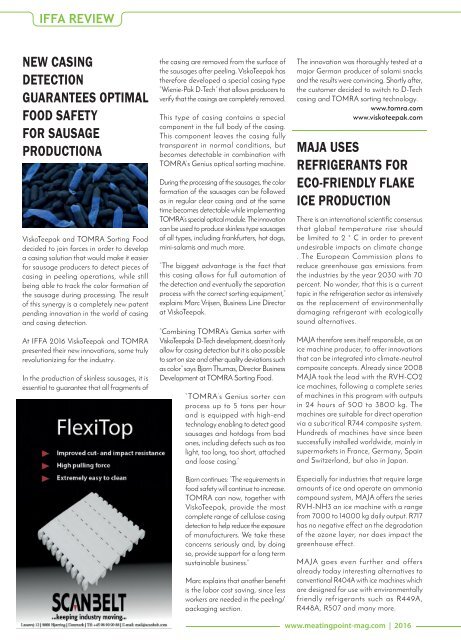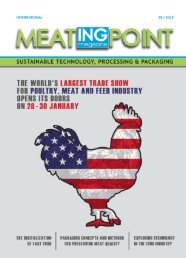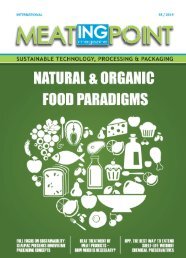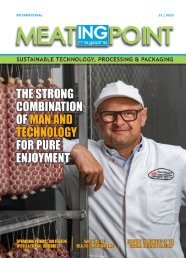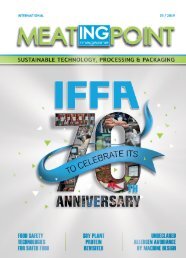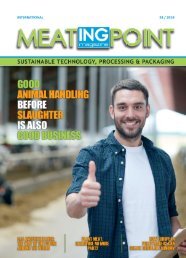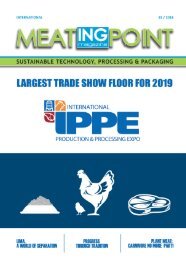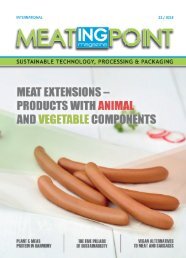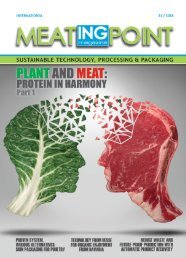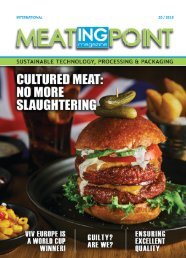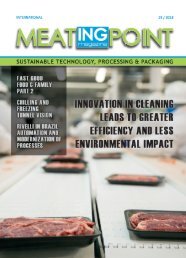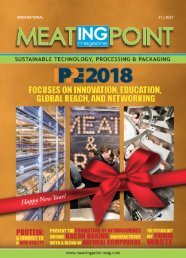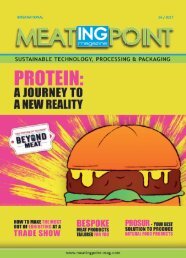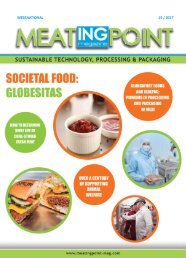MEATing POINT Magazine: #08/ 2016
You also want an ePaper? Increase the reach of your titles
YUMPU automatically turns print PDFs into web optimized ePapers that Google loves.
IFFA REVIEW<br />
NEW CASING<br />
DETECTION<br />
GUARANTEES OPTIMAL<br />
FOOD SAFETY<br />
FOR SAUSAGE<br />
PRODUCTIONa<br />
ViskoTeepak and TOMRA Sorting Food<br />
decided to join forces in order to develop<br />
a casing solution that would make it easier<br />
for sausage producers to detect pieces of<br />
casing in peeling operations, while still<br />
being able to track the color formation of<br />
the sausage during processing. The result<br />
of this synergy is a completely new patent<br />
pending innovation in the world of casing<br />
and casing detection.<br />
At IFFA <strong>2016</strong> ViskoTeepak and TOMRA<br />
presented their new innovations, some truly<br />
revolutionizing for the industry.<br />
In the production of skinless sausages, it is<br />
essential to guarantee that all fragments of<br />
the casing are removed from the surface of<br />
the sausages after peeling. ViskoTeepak has<br />
therefore developed a special casing type<br />
“Wienie-Pak D-Tech” that allows producers to<br />
verify that the casings are completely removed.<br />
This type of casing contains a special<br />
component in the full body of the casing.<br />
This component leaves the casing fully<br />
transparent in normal conditions, but<br />
becomes detectable in combination with<br />
TOMRA’s Genius optical sorting machine.<br />
During the processing of the sausages, the color<br />
formation of the sausages can be followed<br />
as in regular clear casing and at the same<br />
time becomes detectable while implementing<br />
TOMRA’s special optical module. The innovation<br />
can be used to produce skinless type sausages<br />
of all types, including frankfurters, hot dogs,<br />
mini-salamis and much more.<br />
“The biggest advantage is the fact that<br />
this casing allows for full automation of<br />
the detection and eventually the separation<br />
process with the correct sorting equipment,”<br />
explains Marc Vrijsen, Business Line Director<br />
at ViskoTeepak.<br />
“Combining TOMRA’s Genius sorter with<br />
ViskoTeepaks’ D-Tech development, doesn’t only<br />
allow for casing detection but it is also possible<br />
to sort on size and other quality deviations such<br />
as color” says Bjorn Thumas, Director Business<br />
Development at TOMRA Sorting Food.<br />
“TOMRA’s Genius sorter can<br />
process up to 5 tons per hour<br />
and is equipped with high-end<br />
technology enabling to detect good<br />
sausages and hotdogs from bad<br />
ones, including defects such as too<br />
light, too long, too short, attached<br />
and loose casing.”<br />
Bjorn continues: “The requirements in<br />
food safety will continue to increase.<br />
TOMRA can now, together with<br />
ViskoTeepak, provide the most<br />
complete range of cellulose casing<br />
detection to help reduce the exposure<br />
of manufacturers. We take these<br />
concerns seriously and, by doing<br />
so, provide support for a long term<br />
sustainable business.”<br />
Marc explains that another benefit<br />
is the labor cost saving, since less<br />
workers are needed in the peeling/<br />
packaging section.<br />
The innovation was thoroughly tested at a<br />
major German producer of salami snacks<br />
and the results were convincing. Shortly after,<br />
the customer decided to switch to D-Tech<br />
casing and TOMRA sorting technology.<br />
www.tomra.com<br />
www.viskoteepak.com<br />
MAJA uses<br />
refrigerants for<br />
eco-friendly flake<br />
ice production<br />
There is an international scientific consensus<br />
that global temperature rise should<br />
be limited to 2 ° C in order to prevent<br />
undesirable impacts on climate change<br />
. The European Commission plans to<br />
reduce greenhouse gas emissions from<br />
the industries by the year 2030 with 70<br />
percent. No wonder, that this is a current<br />
topic in the refrigeration sector as intensively<br />
as the replacement of environmentally<br />
damaging refrigerant with ecologically<br />
sound alternatives.<br />
MAJA therefore sees itself responsible, as an<br />
ice machine producer, to offer innovations<br />
that can be integrated into climate-neutral<br />
composite concepts. Already since 2008<br />
MAJA took the lead with the RVH-CO2<br />
ice machines, following a complete series<br />
of machines in this program with outputs<br />
in 24 hours of 500 to 3800 kg. The<br />
machines are suitable for direct operation<br />
via a subcritical R744 composite system.<br />
Hundreds of machines have since been<br />
successfully installed worldwide, mainly in<br />
supermarkets in France, Germany, Spain<br />
and Switzerland, but also in Japan.<br />
Especially for industries that require large<br />
amounts of ice and operate an ammonia<br />
compound system, MAJA offers the series<br />
RVH-NH3 an ice machine with a range<br />
from 7000 to 14000 kg daily output. R717<br />
has no negative effect on the degradation<br />
of the ozone layer, nor does impact the<br />
greenhouse effect.<br />
MAJA goes even further and offers<br />
already today interesting alternatives to<br />
conventional R404A with ice machines which<br />
are designed for use with environmentally<br />
friendly refrigerants such as R449A,<br />
R448A, R507 and many more.<br />
22 www.meatingpoint-mag.com | <strong>2016</strong>


